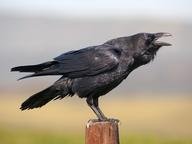Quiz Answer Key and Fun Facts
1. Which of these words is NOT used to describe any of the bells in "The Bells"?
2. "How they tinkle, tinkle, tinkle, / In the icy air of night! / While the stars that oversprinkle / All the heavens, seem to twinkle / With a _____ delight." What kind of delight?
3. "Keeping time, time, time / In a sort of ____ rhyme." What kind of rhyme?
4. "The Bells" is primarily written in anapestic meter and has a regular, predictable rhyme scheme.
5. "From the bells, bells, bells, bells, / Bells, bells, bells." What rhetorical device is used in these lines?
6. How does Poe describe the night air through which the "mellow wedding bells" ring out?
7. "From the molten-golden notes, / And all in tune, / What a liquid ditty floats / To _____ that listens, while she gloats / On the moon!" Who is listening?
8. "What tale of terror, now, their turbulency tells!" What poetic device does Poe employ in this line?
9. "By the twanging, / And the clanging, / How the danger ebbs and flows; / Yet the ear distinctly tells, / In the jangling, / And the wrangling." What is the primary poetic device does Poe use in these lines?
10. Poe also uses personification in "The Bells". Which of these human-like actions does Poe NOT ascribe to the bells?
Source: Author
skylarb
This quiz was reviewed by FunTrivia editor
looney_tunes before going online.
Any errors found in FunTrivia content are routinely corrected through our feedback system.

